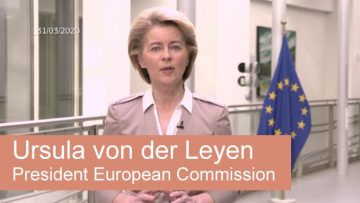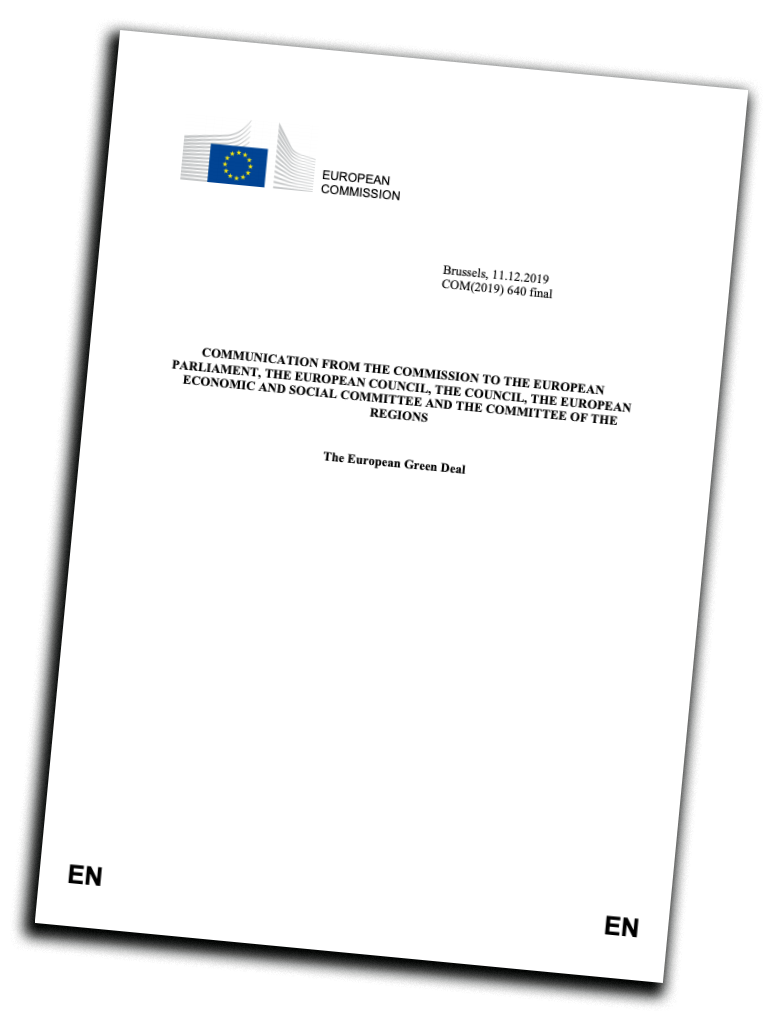Category: Privileges
Renew Europe…
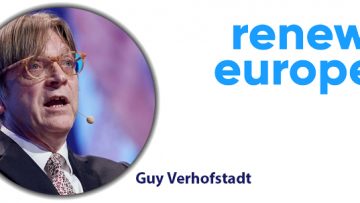
Guy Verhofstadt
Friday 7 February 2020
‘28 years ago we created “European Citizenship”. Now the EU must move forward again. Brexit has shown us that a key reform should be to strengthened & deepen EU citizenship. #IamEuropean’
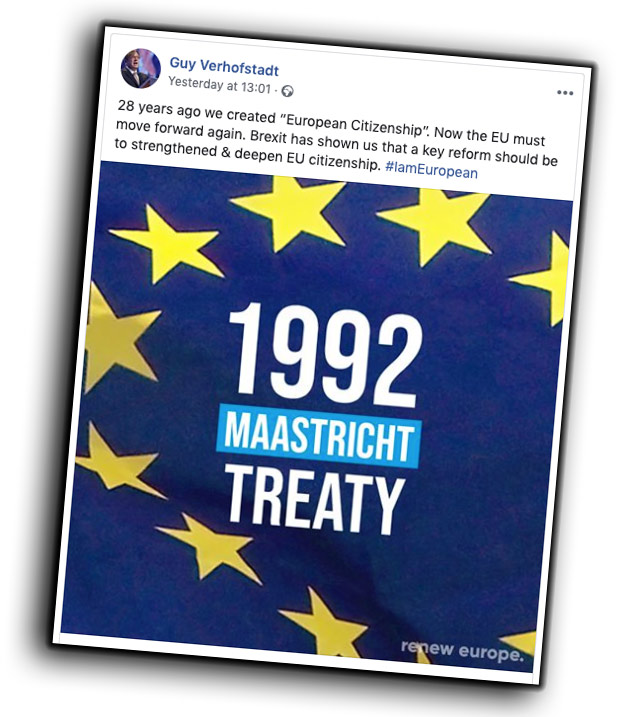
EU fighting climate change
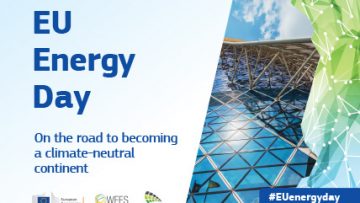
Today is the 9th EU Energy Day and is part of the EU side events at the World Future Energy Summit in United Arab Emirates. It will feature the European Green Deal. The EU is on the road to becoming the world’s first climate-neutral continent!
There will be a chance to discuss the new policy proposals under the Green Deal, such as
- more ambitious energy and climate targets for 2030
- a just transition including a new industrial policy
- a sustainable Europe investment plan
The organisers claim ‘The event will be a meeting place for European research institutions and innovative cleantech companies to share their breakthrough technologies, clean energy solutions, and its upcoming initiatives. The goal is to share knowledge and expertise with international partners and give networking opportunities to businesses, innovators and investors.’
‘Transport accounts for a quarter of the EU’s greenhouse gas emissions, and still growing. To achieve climate neutrality, a 90% reduction in transport emissions is needed by 2050.‘
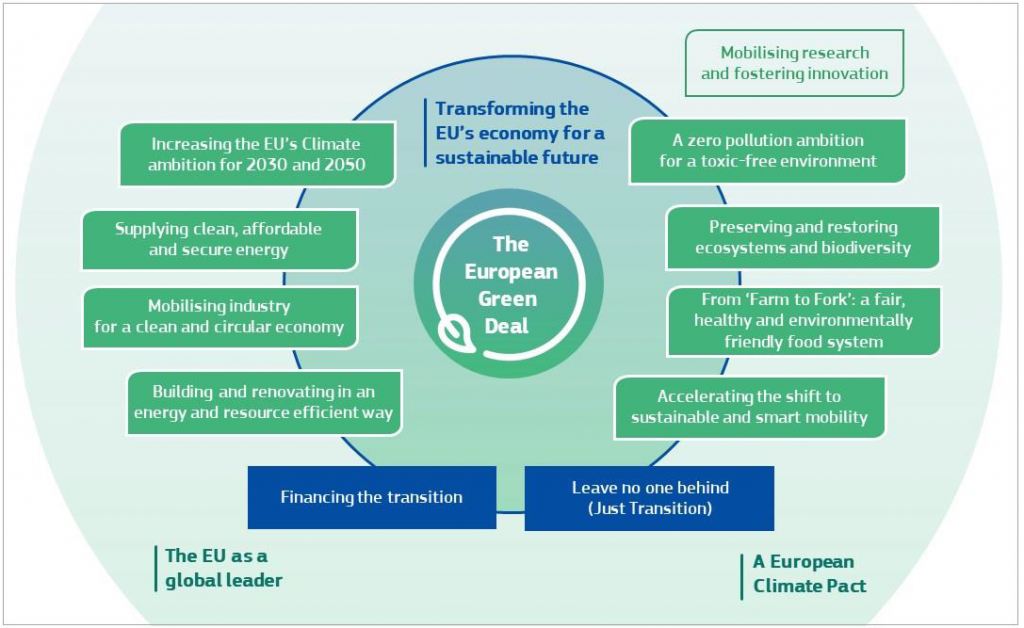
The ‘European Green Deal’ is a probably the most ambitious project of this century, and assuming I reach the ages of my grandparents, something I will see!
The plan is for zero net carbon emissions by 2050 with a full transformation of our economy. This will involve massive investments of €260 bn per year. There is ‘carrot and stick too’ — tough measures against third countries that produce cheaper but carbon-intensive goods.
A Sojourn in Suceava

Why a sojourn?
Most of my work since 1990 has been connected in some way with the development of the European Union, its policies, its enlargement and its trade agreements. In other words, the European Union has become a fairly central part of my sense of identity.
When my own country (the United Kingdom of Great Britain and Northern Ireland) set itself on the path towards leaving the EU, I found myself becoming stressed to the point of cracking because of one simple fact: I know too much about the realities of EU policy and trade agreements to enable me to accept the situation in the UK. I needed a period of time in which to detach myself from the day-to-day political goings-on in my country, so as to be able to relax and get things in perspective.
Why Suceava? ... and where is it?
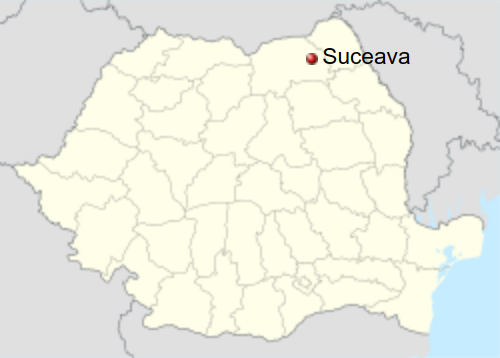
Suceava is the administrative capital of Suceava county (Judeţul Suceava) in northeast Romania. I had visited it very briefly in 1992, for work purposes, and again in 2018 when my wife and I spent three days there on vacation. The city itself is unremarkable, though pleasant enough; its attraction as a tourist destination derives from the beautiful painted monasteries of the Bucovina region in which it lies.
I chose Romania as my country of sojourn for one very practical reason: I speak Romanian fairly fluently as a consequence of getting on for nine years’ cumulative work experience in the country. I did not know Suceava particularly well, so there would be a certain challenge in getting used to a new city. It had the merit of being on the cheaper side of average for the main Romanian cities. Most of all, though, it offered the chance to get to know better one of the local churches that we had attended while on holiday in 2018.
I rented a comfortable but fairly basic Airbnb apartment in Suceava’s Strada George Enescu. It had everything I needed to continue my work for the two charities with which I’m involved, was within easy walking distance of two supermarkets and a Kaufland hypermarket and had a very nice pizzeria only a couple of hundred metres away. Its staff never failed to make me feel welcome. It would require only a fifteen minute walk to get me to the city centre.
Initial impressions
I was met at Suceava airport by the pastor of the church that my wife and I had visited in 2018, which cushioned the impact to some degree. My immediate reaction on being left alone in the apartment at close to midnight on 27th October 2019 was to ask myself what on earth I was doing. Here I was, in an unfamiliar apartment, in an unfamiliar city in a fairly way-out part of Romania, for no other reason than that I had chosen to come here. Seven weeks of food shopping, cooking, washing, ironing and all the usual stuff lay ahead of me. I felt better after buying a stack of food in the local Kaufland because it reassured me that my language skills were good enough to avoid any comment about my origins. “I’m still in the European Union” I thought to myself “and if I do get into trouble I have friends here.”

















Daily life

I settled quickly into a routine of shopping, walking around the city, cooking (or eating out if I felt lazy) and laundry. I had frequent video meetings with colleagues associated with my charity work. Communication with my family could not have been simpler, thanks to the absence of any mobile phone roaming charges within the EU. Such a pleasant change from “the olden days”! The weather was for the most part very pleasant although we did have one very cold snap about four weeks into the period.
It took me a couple of days to attune my ear properly to the local accent but from then on I had absolutely no problem with communication. Nobody with whom I spoke, who did not already know that I’m British, made any comment, more probably out of politeness than because of the quality of my spoken Romanian. The apartment had no oven, only a gas hob and a microwave; so cooking sometimes involved a bit of experimentation. Nevertheless, overall I ate pretty well and the availability of good, cheap wine was a bonus.





Church activities
I found myself very much welcomed into three churches: Baptist churches in Suceava and Câmpulung Moldovenesc and an independent free church (Calea Bucuriei) in Iaşi. It seemed almost axiomatic that I would be asked to speak on each occasion or even asked to play the piano. I met some truly lovely people in those churches, who made me feel so at home that I quickly forgot the stresses that had driven me to Romania in the first place. One of the legacies of my visit to Câmpulung was a Romanian language version of one of my pieces of published choral music. Thank you, Ilie and Mihaela, for providing me with the inspiration to complete this and thank you, Mihaela, for making my day by describing my Romanian as “exquisite”!















Community and Shared Citizenship
Never at any point in my sojourn did anyone treat me as a foreigner. Never. Not even once. I had various ad hoc conversations with people in supermarkets, in stations, on trains, in taxis, in restaurants and in the apartment itself (with my Airbnb cleaning lady, who has been a real gem): and as far as I am able to judge, people regarded me as just another Romanian, albeit one who might have lived abroad for several years. It wasn’t just the language although obviously a person with less than fluent Romanian would have a different experience in some respects. It seemed to me that there was a genuine sense of “being in this together”. Many people expressed grave concern regarding the political situation in the UK and quite rightly so in my opinion. Yet the overall feeling was one of exhilaration, of enthusiasm for a shared set of values even if the implementation might be flawed. I can say with my hand on my heart that I felt truly at home. I lost count of the number of times that people encouraged me to buy a house here.
Yes, I missed my wife and family. I would be less than human if that were not so. In compensation I learned that the European community (sic) is very real – if you will open your mind, set aside any preconceptions and interact with people as people, just like you and me.
You’ve got to love Suceava.

Epilogue
I travelled back to the UK on 14th December 2019. A few days later the front doorbell rang here at our home in the west of England. It was an Amazon guy, who needed a photo ID in order to deliver a bottle of whisky. My passport was still in the hall, so I showed it to the man, explaining that I’d just got back from Romania. “Really?” he said, “I was born in Romania.” I switched into Romanian. “Where from?” I asked. “Iaşi” he replied. I told him (still in Romanian) that I was in Iaşi a few weeks ago. “So how come you speak such good Romanian? I mean, it’s not just good it’s … grammatically perfect!” I told him I’ve worked in Romania on and off since 1990, adding that I’d just spent seven weeks in Suceava. He looked totally bemused. “I was born in Suceava” he said. I told him that I had an apartment on Strada George Enescu. At this point he was silent for half a minute, staring at me. Then he said, “I was born in Strada George Enescu.”
Eurobarometer 2019
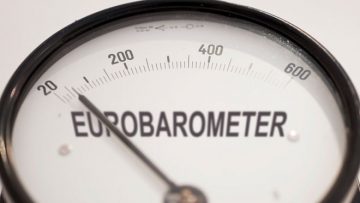
Every year the European Commission does research in every country in the EU to find out the opinions and feelings of EU citizens. Sometimes it’s what they might consider ‘good news’ sometimes ‘bad news’. What can definitely be said is that it’s not propaganda.
The results are published every August. Here are the results for this year’s survey.
One thing that has been of concern to all EU citizens is how much one can trust the EU, their own national government and their own national parliament. It’s been pretty level for the last few years with a very slight right in trust for the EU. This isn’t surprising as there were EU elections this year so people would look at the European Parliament more closely.
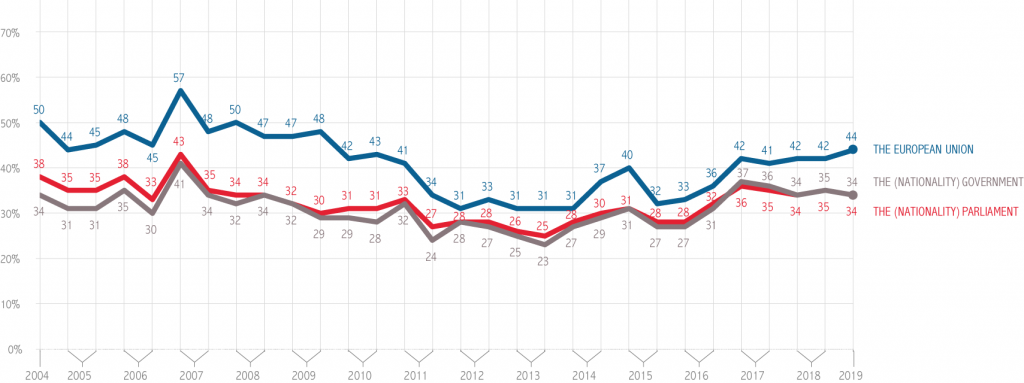
What is also unsurprising is the country spread from 72% trusting the EU in Lithuania to 29% trusting the EU in the UK. Only 5 of the 28 countries have more than half the population distrusting the EU.
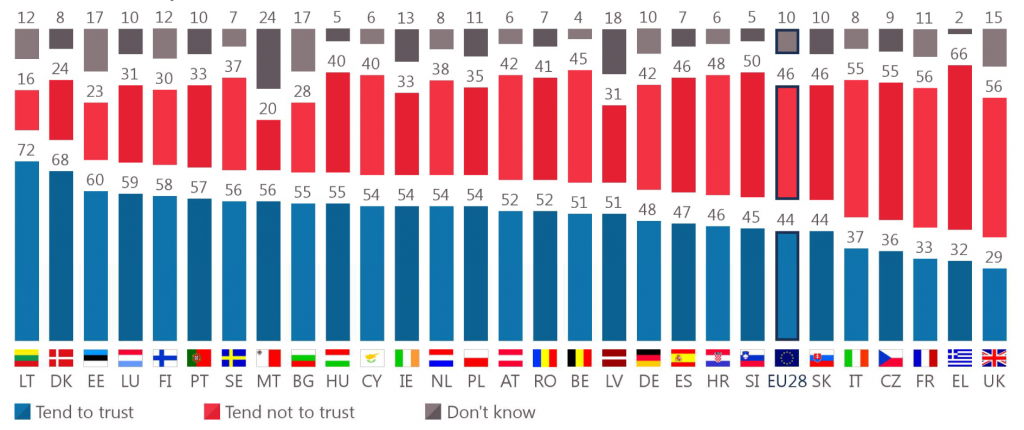
However, although there is some distrust the overall image of the EU is increasing – and quite dramatically. Since the low point in the first half of 2016 it has risen from 34% to 45% and the negative image of the EU dropped from 27% to 17%.
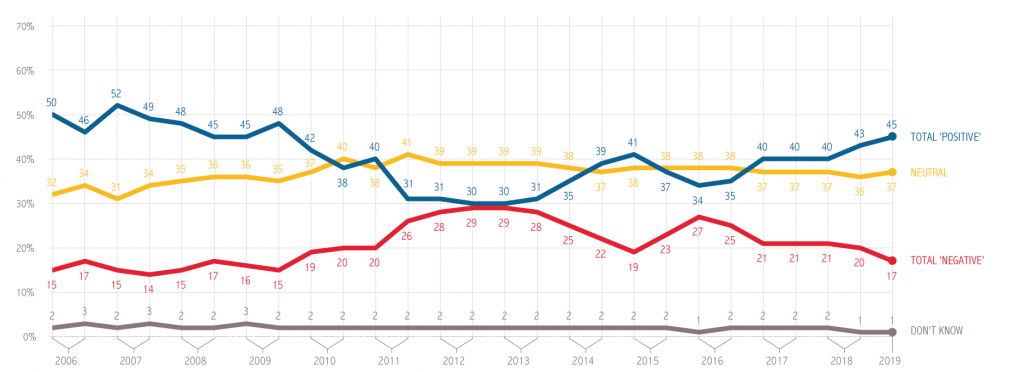
And looking at the future of the EU the trend is even higher. Now 61% of EU citizens are optimistic about the future of the EU and 34% pessimistic. All except the UK and Greece have half the or moe of the population optimistic about the future of the EU!
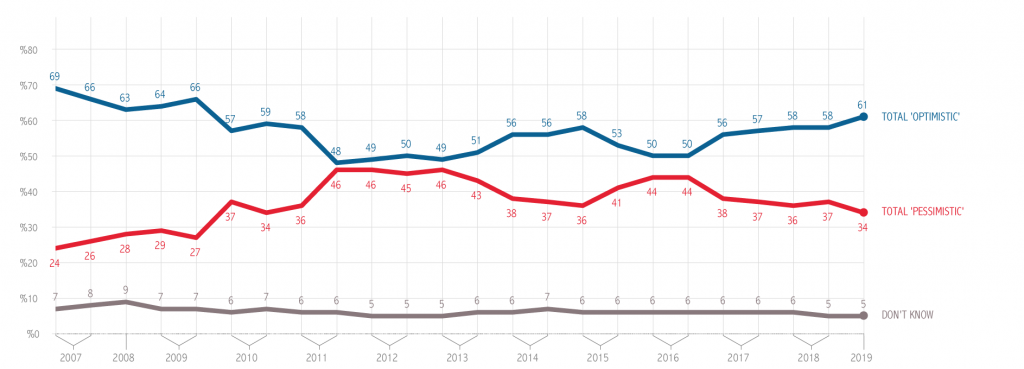
The most dramatic change though is how much EU citizens believe their voice is heard in the EU. Since 2004 those people who believed their voice was not heard were in the majority, with at the highest point two thirds of EU citizens believing their voice was unheard.
This has now switched. In this survey 56% believe their voice heard and only 39% believe their voice unheard. The countries that have the lowest perception of their voice being heard are Cyprus, Latvia, Greece and Estonia where less than one third feel their voice is heard.
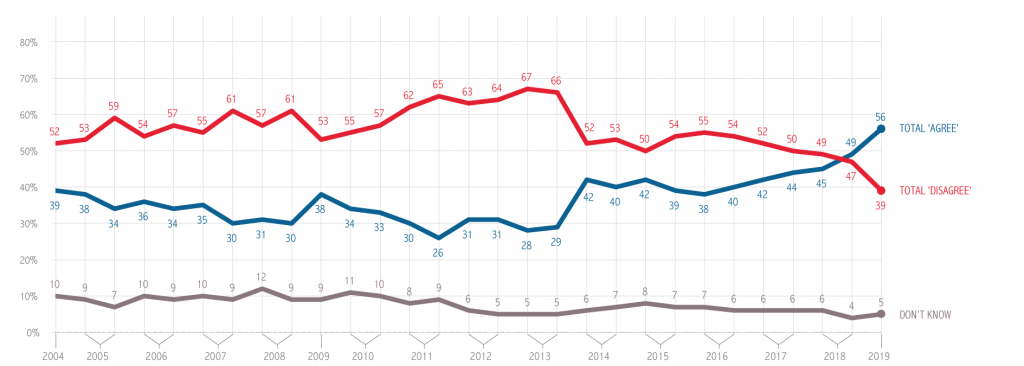
Along with that there is an increasing satisfaction with the way democracy works in the EU. Again this year being a European Parliamentary election year that is hardly surprising. People see how EU democracy works first hand!
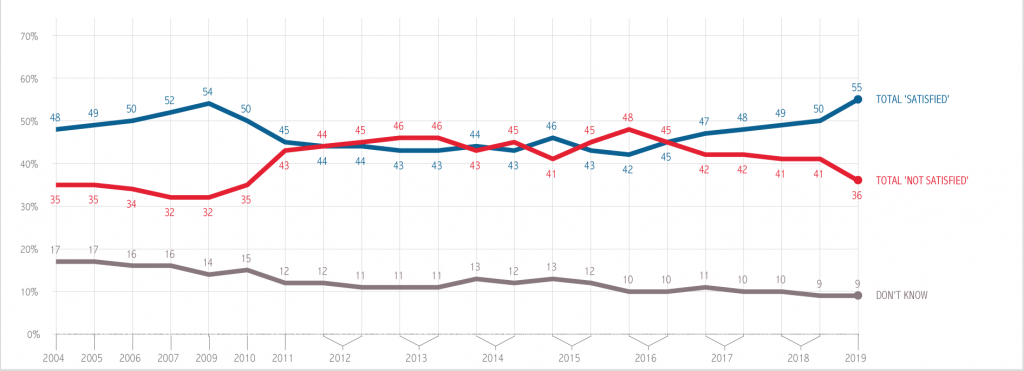
Right across the EU a majority of the population are citizens of the EU. This is internalising the factual truth of being one. Since the autumn of 2018 the feeling of being an EU citizen has increased in 22 of the 28 member states. In Cyprus this rose dramatically by 8% to 73%.
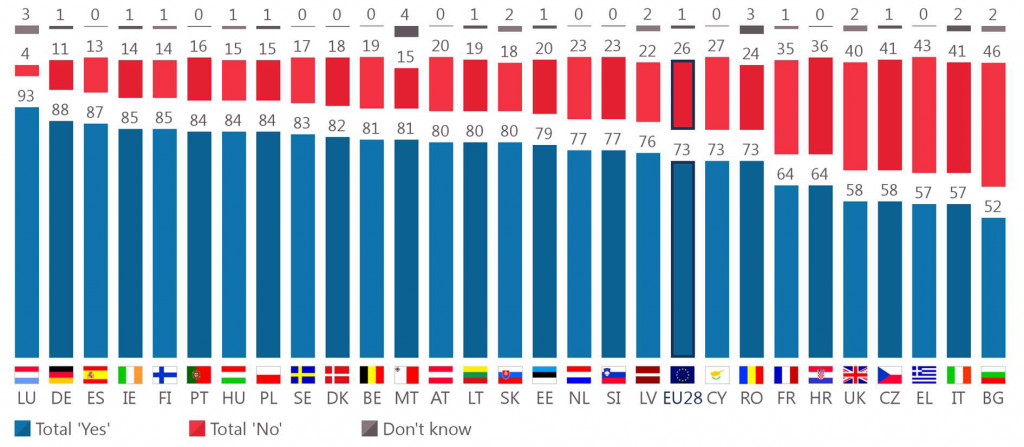
But being an EU citizen is more than just a feeling. The survey asks which of a list of attributes of the EU are the most positive. The two leaders by a long way are the free movement of people, goods and services and peace among the member states of the EU.
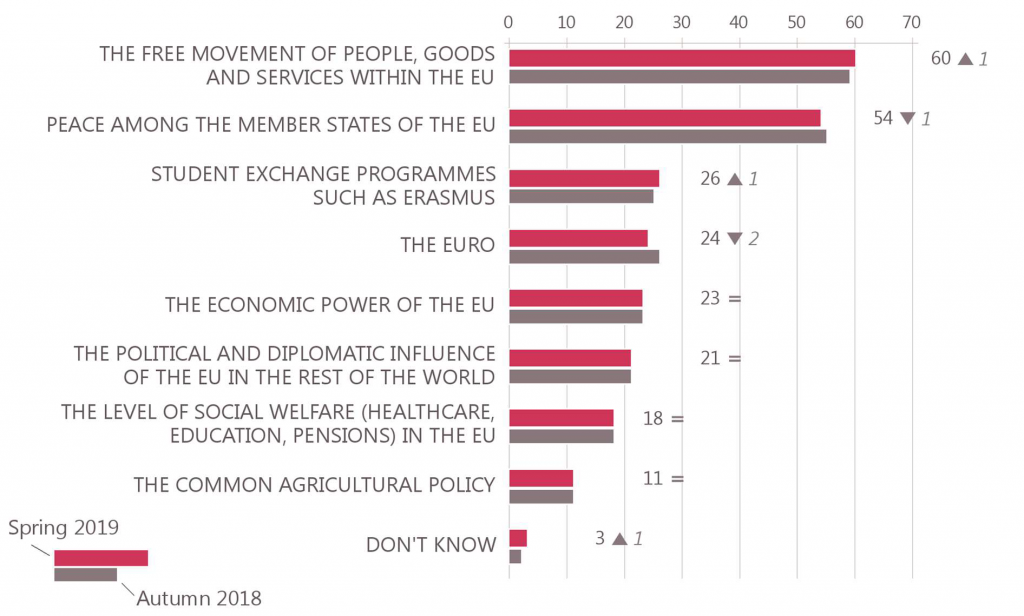
Alongside the attributes of the EU are our achievements as a community: Cheaper calls when using a mobile, improved consumer rights and other cross border protections.
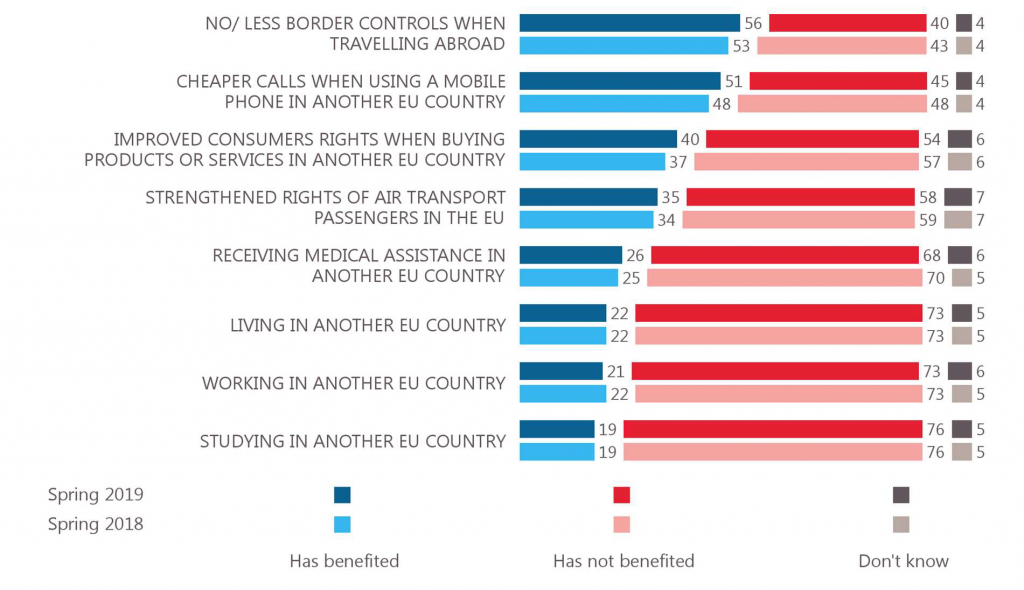
Of course as well as achievements there are concerns: Immigration, climate change, the economic situation, terrorism and so on. Immigration though still the leader dropped 6% as a concern, to the point that it is now only one of the two top concerns for one third of EU citizens.
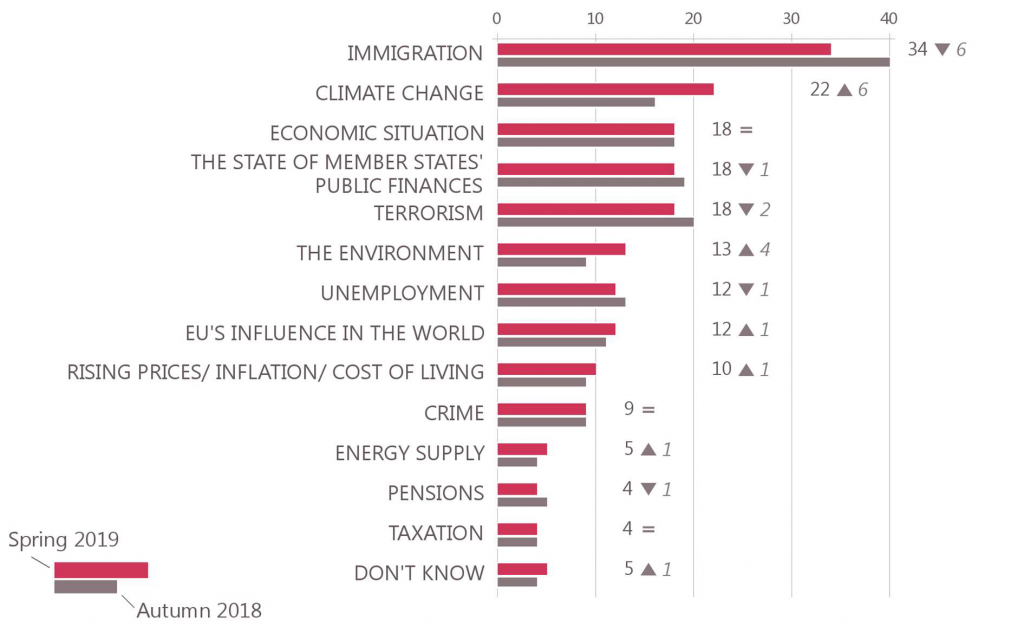
Looking at this over the past five years one can see that concern over immigration started lower than today, peaked and is now on a downward trend. Similarly terrorism.
But rising now, are climate change and the environment. If the trend continues these will be the primary concerns over the next few years.
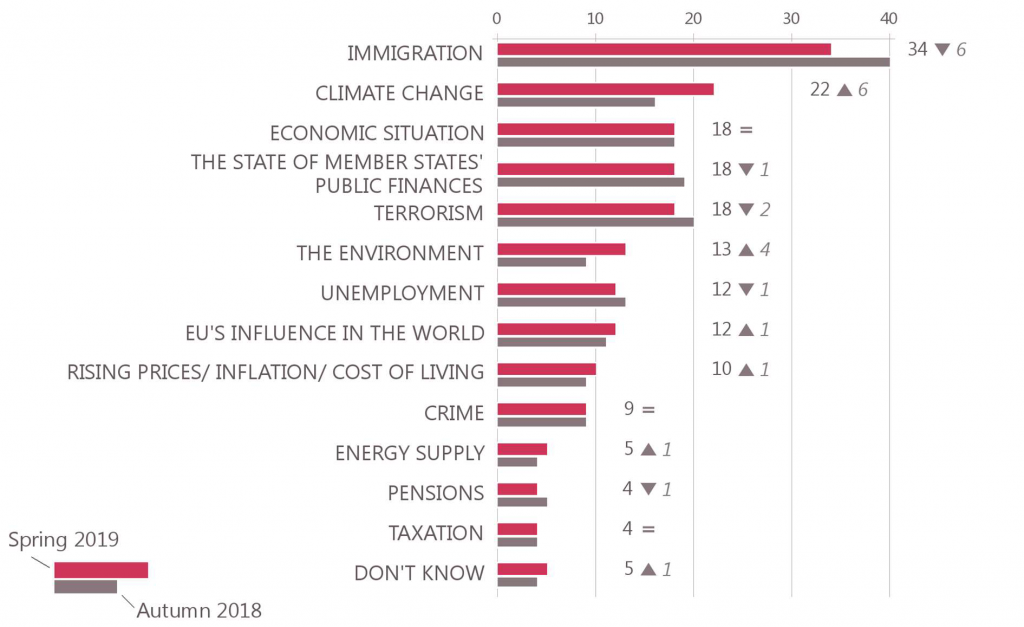
Although immigration is the number one concern for the EU as a whole, at the national level it is down to number five. This probably means we can expect to see that drop further in the coming years.
At the national level the environment and climate change are rising, but the two top issues are unemployment and the cost of living. These are normal peace time concerns.
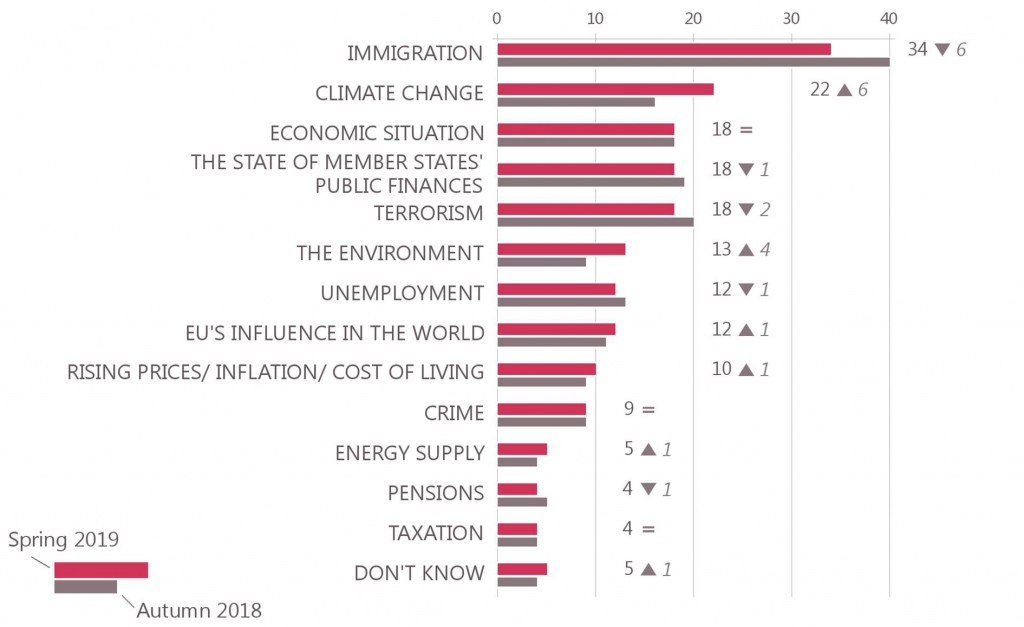
Although those are the concerns looking back over the past five years there are dramatic changes. In 2004 nearly half EU citizens were concerned about unemployment!
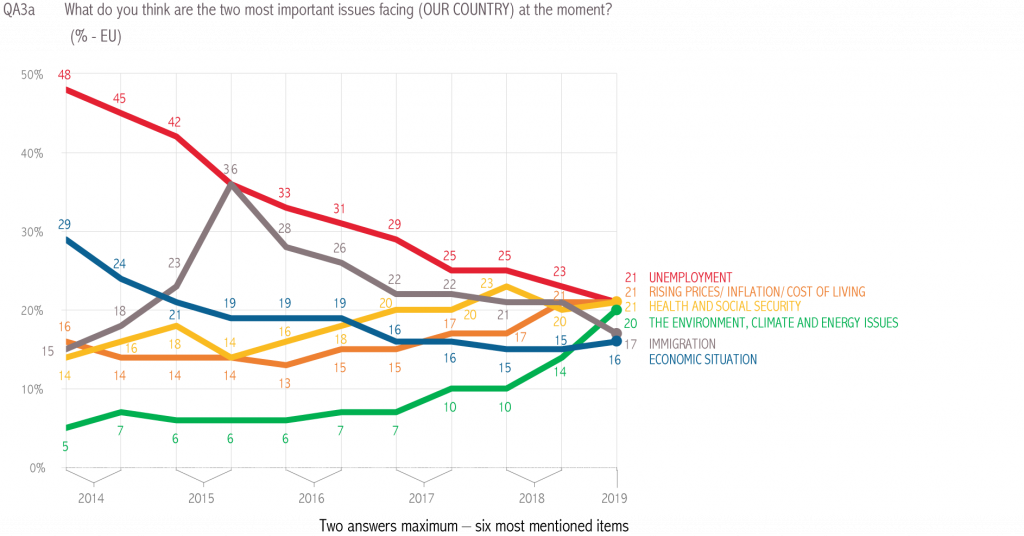
Economically about half of EU citizens believe that the EU economy continues to be good and just over one third believe it to be bad.
However, when asked about the Euro as a currency more than three quarters of those in the Euro zone are for the currency and nearly two thirds of those outside the Euro zone are for the currency. In seven countries, all outside the Eurozone, the majority of EU citizens responded against the currency.
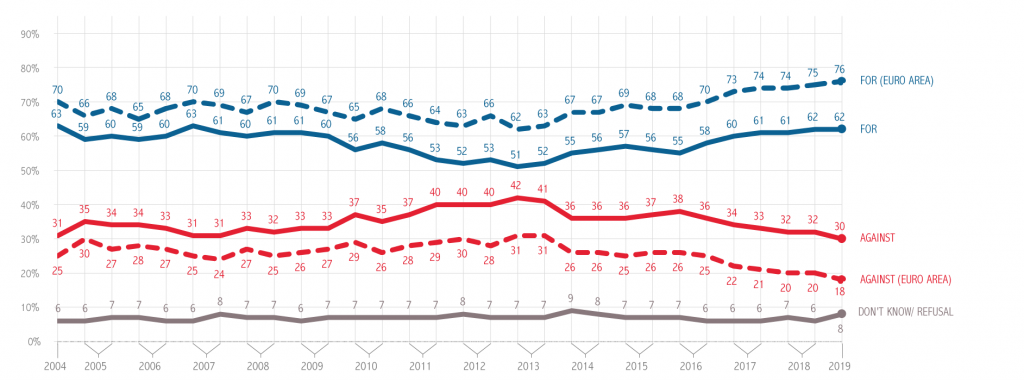
Overall the Eurobarometer appears to show the EU in a more positive light than at any time over the past decade!
Óda na radost – flashmob Tentokrát budu volit
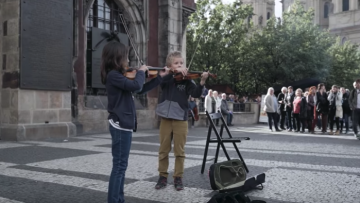
Young and old - 'Ode to Joy' - the anthem of European Union citizens
Flashmob video that brings joy to our hearts!
